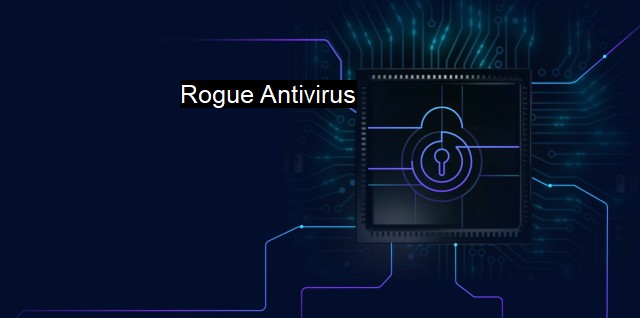What are Rogue Antivirus?
Rogue Antivirus: Understanding and Protecting Yourself Against Cybersecurity's Pernicious Threat
Rogue antivirus is a term that denotes a type of malicious software (malware) that pretends to be legitimate antivirus software. It is designed to deceive users into partaking in an action that is in keeping with the objectives of the attacker behind the rogue antivirus software. Typically, rogue antivirus software is disguised as genuine security applications or services. It may even look like a formal product from commercial antivirus vendors.In most cases, rogue antivirus is posted online. It’s found in pop-ups or other ads that warn users their computers are infected with many issues, from viruses to potentially incriminary items, offering up handy solutions in the form of convenient links directing them to a fix. The cycle of the attack usually consists of three steps. Firstly, the user's computer gets infected with basic malware. Then, the infected computer starts to display ads suggesting a security software purchase. The rogue antivirus offers to help with the nonexistent security threat that it has claimed is at hand. Lastly, on payment, the rogue software either does nothing or installs other malware.
Rogue antivirus is part of a larger phishing scheme, known as scareware. Scareware is designed to frighten a user into buying and installing a specific antivirus product that will supposedly remove the detected threats. The danger with a rogue antivirus is that it can be tough to distinguish it from real, protective software.
Rogue antivirus and other scareware serve one main purpose: to make money unlawfully. Fraudsters potentially gain in two ways. One is financial, as they get paid for the so-called antimalware software. The second is data theft. Often, victims will knowingly provide personal information, such as bank account and credit card details, to the cybercriminal during 'purchase'. What victims believe to be a solution to a cybersecurity issue only opens up their system further to attacks.
A few noticeable signs can indicate whether software might be rogue antivirus. For instance, if the malware advisory appears suddenly and is not from your standard antivirus software, it could be a rogue software trying to mislead you. Remember, reputable antivirus software doesn't pop up warnings on web pages outside of dedicated software interface. Rogue software often overstates threats, claims the system is riddled with hundreds of viruses, and insists on immediate action. They tend to bombard you with persistent, regular pop-ups that make it hard to close or ignore the advertised application and they offer quick remedy to force payments from anxious victims.
As with broader cybersecurity, protection against rogue antivirus software is layered. Good practice for individuals and businesses include secure and frequent backups of vital data; updating all software, many updates offer patches for security vulnerabilities; regularly updating antivirus software and having firewall configured. User knowledge is an important aspect of personal protection and safety. Be aware of the threats, avoid clicking unfamiliar links or attachments in emails, use strong, unique passwords across all accounts, and be critical when providing personal information online.
The key to protecting systems or networks from rogue antivirus threats lies in taking a proactive approach. This involves the use of comprehensive cybersecurity strategies including advanced antivirus solutions, intrusion prevention systems, regular system backups, and most importantly, cybersecurity awareness training amongst users.
Rogue antivirus is malicious software masked as genuine software, using fear tactics to manipulate users into purchasing a falsified fix or freely providing vital personal information. Though they can be difficult to distinguish from real software, knowledge of their key characteristics can significantly aid in steering clear from these threats. a combination of user awareness, routine software updates, secure data practices and advanced cybersecurity systems collectively work in providing a strong defense against rogue antivirus.

Rogue Antivirus FAQs
What is a rogue antivirus?
A rogue antivirus is a type of malicious software that mimics legitimate antivirus software. It tricks users into thinking their computer is infected with viruses and offers to remove them for a fee.How does rogue antivirus infect a computer?
Rogue antivirus can be downloaded and installed onto a computer by clicking on misleading advertisements, downloading software from untrusted sources, or falling for phishing scams.What are the consequences of a rogue antivirus infecting a computer?
Rogue antivirus can cause a lot of damage to a computer. It can slow down the system, steal personal information, delete files, and even prevent the installation of legitimate antivirus software.How can I protect my computer against rogue antivirus?
You can protect your computer by installing reputable antivirus software and keeping it up to date. You should also avoid clicking on suspicious links, downloading software from untrusted sources, and be cautious of emails and messages from unknown senders.| | A | | | B | | | C | | | D | | | E | | | F | | | G | | | H | | | I | | | J | | | K | | | L | | | M | |
| | N | | | O | | | P | | | Q | | | R | | | S | | | T | | | U | | | V | | | W | | | X | | | Y | | | Z | |
| | 1 | | | 2 | | | 3 | | | 4 | | | 7 | | | 8 | | |||||||